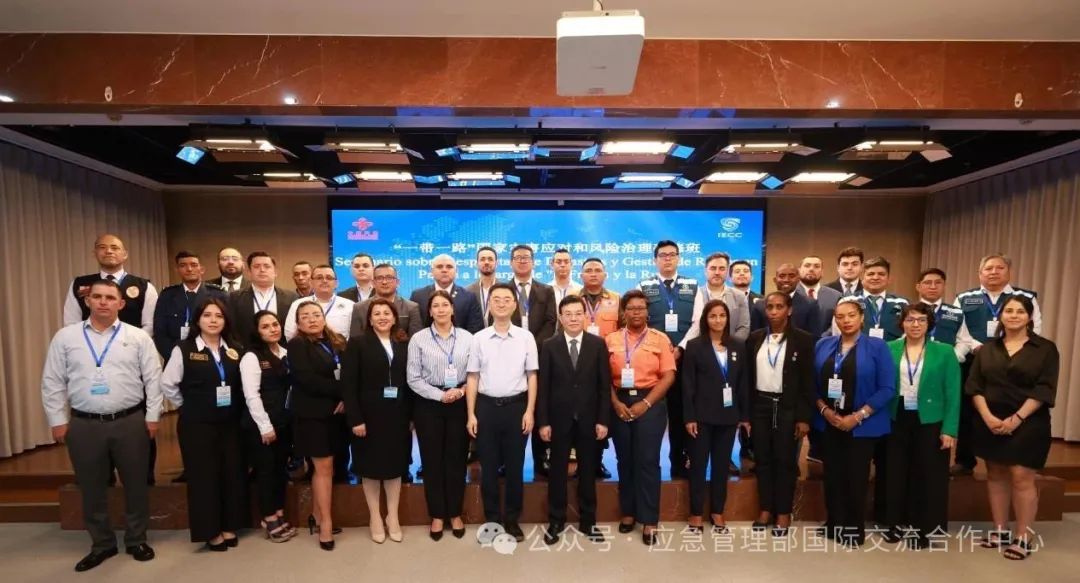
At the opening ceremony, participants shared their experience in disaster response and risk management and expressed their anticipation on the seminar.
Mr. Ignacio Ullua from Argentina’s Ministry of National Security shared that the Federal Emergency Agency has been established recently, marking a major advancement in disaster management. He emphasized that efficiency of emergency response has been improved through a systematic approach involving prevention, response and reconstruction phases, the Agency can coordinate various resources including federal forces, armed forces, and the Ministry of Health.
Mr. Carlos Guillermo Bernales Espinoza from Chile’s National Service for Disaster Prevention and Response (SENAPRED), said that Chile has adopted a systematic approach to deal with emergencies, disasters and catastrophic events by coordinating human and material resources, implementing tiered responses, mutual-aid models, and community participation to make sure the agreed response objectives. He stressed the vital importance of international experience in protecting life and environment, and looked forward to technical exchanges with China.
Mr. Fernando Antonio Villalobos Chacón from Costa Rica’s Municipal Council of Esparza, shared that Costa Rica is known for its commitment to peace and sustainable development. In response to frequently-occurred disasters caused by climate change, Costa Rica has strengthened community resilience and ecological protection. He hopes to learn from China’s comprehensive strategies and mass mobilization capabilities and improve the standard of disaster response across Latin America via mutually beneficial exchanges with China.
Mr. Yunier Hernández Soto from Cuba’s Civil Defense Office of Havana Province, said that Cuba is vulnerable to droughts, floods and hurricanes. Through joint efforts of various government departments, Cuba is striving to build an inclusive society with a high level of risk awareness and resilience to reduce vulnerability and enhance disaster response capabilities.
Ms. Acosta Turcios Sheyla Suyapa from Honduras’ Department of International Cooperation, Ministry of Emergency Management, said that Honduras ranks fifth globally in vulnerability and the recent meteorological disasters have destroyed 40% of the country’s infrastructure and crops. She emphasized the urgent need to learn from China to optimize disaster preparedness and post-disaster recovery systems.
Mr. Norman Ernesto Mora Cerda from Nicaragua’s Disaster Prevention and Mitigation Committee said that since 2007, Nicaragua has followed a people-centered governance model and established strategic alliances among national institutions, local governments and communities. Through improved legal frameworks and community structures, Nicaragua has transitioned from post-disaster accounting to prevention first. He added that the government is working on building an integrated, digital and mobile emergency information management and response system, covering all emergency-related departments, all provinces and cities across the country.
Ms. Sabrina Katiuska Sarria Torres from Peru’s Prime Minister’s Office affirmed China’s disaster prevention and response expertise and considered the seminar an excellent platform to convey feelings, share practices and strengthen mutual understanding. She said Peru will continue to strive to promote the resilience and mutual assistance in global disaster risk management.
Mr. Nestor Fabian Alvarez Manzi from Uruguay’s National Emergency System (SINAE) emphasized that Uruguay has managed to dispel the idea that “Nothing will go wrong here” through a risk culture public campaign. The country has introduced innovative tools, such as podcasts and household-preparedness guides, and implemented tiered responses through a network of local emergency committees. Additionally, Uruguay’s SINAE organizes “Disaster Prevention and Mitigation Week" annually to enhance risk awareness of the entire society
Mr. Galvy Ramon Nunez Castro from Dominican Republic’s National Office for Seismic Evaluation and Vulnerability of Infrastructure and Buildings (ONESVIE), said that the country lies at the junction of the Caribbean hurricane belt and a seismic zone, facing severe threat of natural disasters every year.
The Dominican Republic government attaches great importance to cooperation and mutual benefit in international disaster management and hopes that the seminar will enhance the country’s emergency professionals’ competence, promote international exchanges of experience, strengthen construction of disaster management agencies, and provide strong support for the country’s disaster prevention and mitigation efforts.
The two-week seminar will be composed of classroom lectures, field visits, case studies and interactive sessions, during which systematic introduction will be made on China’s experiences and practices in disaster response and risk management. Lectures will be offered by leading Chinese experts and scholars on topics such as disaster risk reduction, emergency rescue and work safety management. Participants will also visit relevant institutions and enterprises to gain in-depth insights into China’s latest innovations and applied practices in the emergency industry.


